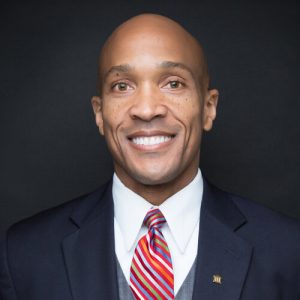In the world of transformational leadership, Dr. Dwight E. Rhodes is well-known for his expertise in DEI, instructional leadership, executive coaching, and strategic planning skills.
He is the founder and CEO of Rhodes2Equity LLC, which improves learning outcomes for historically marginalized students, and R2E, a nonprofit initiative supporting BIPOC/LGBTQIA+ leaders.
Dr. Rhodes has a proven track record for disrupting systems of educational injustice as a former state, district, and school leader. With years of experience as an award-winning middle school teacher in Atlanta, Ga., and as an elementary school principal in San Francisco, CA., Dr. Rhodes accepted the offer as the founding Chief Academic Officer for ReNEW Schools in New Orleans after Hurricane Katrina devastated its school system. Dr. Rhodes transitioned from that role to pursue his doctorate in Educational Leadership at Harvard University. From there, he transitioned back to Georgia as its Chief Transformation Specialist, leading a team of Transformation Specialists in turning around some of Georgia’s lowest-performing schools. By unapologetically continuing to root his work in DEI, he and his team persist in dramatically improving student learning outcomes for all students and the leaders who serve them.
Upholding values and embracing identity 
Dr. Rhodes said two shifts stand out in rooting his work in DEI over the past few years. The first is his team’s intentional move to uphold their values as an organization, focusing on putting students first, not politics or profits. Dr. Rhodes shared that his team is now more intentional in determining the alignment of values before partnering with organizations and individuals. They aim to work with organizations that are willing to engage in the heavy lifting of mindset-shifting as an organization rather than just checking the box of providing DEI training and support. “We’re holding that we are going to do the heavy long-term, sustaining work of providing and creating liberated learning spaces rooted in diversity, equity, and inclusion,” says Dr. Rhodes.
The second focuses on directly supporting system-level leaders and aspiring leaders to transparently and intentionally fight against the “Don’t say gay” movement that is insidiously spreading throughout our country. As a black gay agnostic man, who is married to an immigrant, and currently living in the Deep South, Dr. Rhodes recognizes the significance of intentionally leading with his identity markers in his work. Through R2E, his nonprofit initiative, Dr. Rhodes’ ultimate vision is for leaders and aspiring leaders to fully embrace their identity markers as an asset, not a liability, and authentically lead with their “full self”, particularly in rural and marginalized communities. These leaders will serve as beacons of hope for many students struggling to live authentically.
Creating space for collaboration and prioritizing self-care
As a member of the Catalyst:Ed provider network. Dr. Rhodes has the opportunity to connect and collaborate with a diverse group of practitioners and consultants who are experts in different areas. Dr. Rhodes now leads the DEI Provider Resource Group (PRG), which meets monthly to discuss a problem of practice or barriers colleagues face in their work. “There’s a tacit understanding that providers in this network ultimately want to serve students by serving the leaders who serve those students, “he says. “At the end of the day, I believe that the providers really want to do this work to radically transform learning outcomes for those in historically underserved communities.”
When asked about advice for other providers looking to expand their business or grow their impact, Dr. Rhodes emphasizes the importance of self-care. He believes, and research supports, that being intentional about self-care should be a top priority for all individuals, especially for leaders in the education sector. “If my team and I are going to continue to be the change agents for the students who have been historically marginalized and neglected—those students and leaders should see us prioritizing self-care,” says Dr. Rhodes. He also stresses the need to consider how potential partnerships will impact their ability to care for themselves rather than just how they will enhance their business development.
Dr. Rhodes’ focus on diversity, equity, and inclusion has been an asset to our provider community. His commitment to self-care and collaboration is also inspiring. It provides a valuable perspective on how to serve the leaders who serve our students. For more on the Catalyst:Ed provider network, follow this link.
